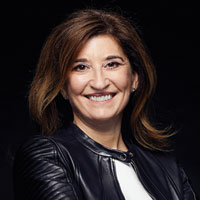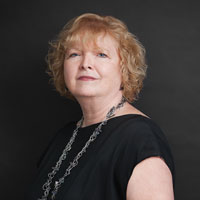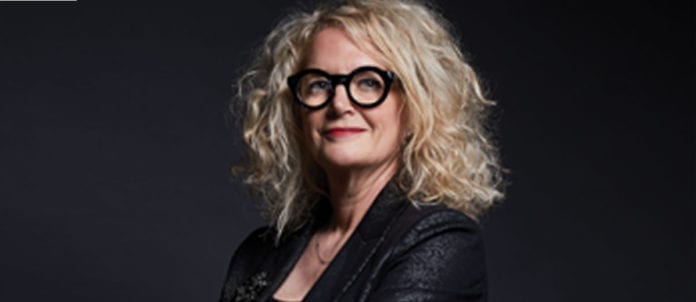When Marie-Line Beauchamp was a child in Montreal, her grandmother used to greet her with a regular after-school treat. Apple pie, chocolate cake, sugar pie, pouding chômeur — all cooked from scratch, all spun into fragrant magic with the 35-per-cent cream that was a house staple. The experience fed all kinds of appetites for Beauchamp, who grew up to be the Chief Operating Officer at Canadian foodservice franchise superstar MTY Food Group.

MARIE-LINE BEAUCHAMP
Chief Operating Officer, MTY Food Group
Beauchamp started in the foodservice industry when she was 16, working in a downtown-Montreal Laura Secord location. There, the ice cream and chocolate were uniquely supplemented with a cheese counter: 15-year-old cheddar, Brie from France, a chocolate-cheese hybrid. The job proved a heady experience for a young woman with culinary appreciation in her genes. “The first time I served Stilton, it made me think of the opportunities with food all over the world.”
Today, Beauchamp leads MTY’s casual-dining channel, where she oversees a bustling franchising department. She’s interested in restaurant layout and how technology can help improve efficiencies and productivity lost to shriveled labour pools. And she considers delivery the industry’s hottest spot. “People are sitting on their couch today and they want food in front of them while they watch Netflix.”
Her distinction as a female executive is not remarkable to her — it’s all she’s ever known. Besides, she’s more concerned about “the level of comfort you feel with yourself than your gender.” Still, Beauchamp is mindful of the challenges women face and so makes an effort to champion this population. Half the staff who report to her are women and she always nudges women in the direction of promotion. And, as a certified coach, she enjoys mentoring other women.
She thinks the marriage between women and restaurants is a natural one. “It’s a people industry. Women have good people skills.”

MARGOT MICALLEF
Agent/Franchisee (Western Canada), Subway
The first time Margot Micallef participated in the hiring of a fellow board member for an electrical utility in Alberta, the headhunter only delivered male candidates. Two years later, when she was chairing the committee, Micallef was more direct with the executive search team. “I said, if you don’t bring me the same number of female as male candidates, I won’t believe you can do your job.” Then she said the headhunter also had to be female.
Micallef, who holds the Western-Canadian rights to the Subway restaurant franchise, co-wrote a book — It’s the Landing that Counts — on how to surface from adversity and find opportunity besides. Opportunity is something with which she’s never had a problem. After leaving her first career as a lawyer and her second as SVP at Shaw Communications, Micallef started her own merchant-banking business, Oliver Capital Partners, in 2003. Here, she invests her own and others’ capital in diverse businesses that she builds up and then either sells or holds. Subway is one of them.
When she started practising law in B.C. 30 years ago, the Maltese-born Micallef was pretty singular in her gender representation and a lot of the male partners were “suspicious.” She lied about attending her son’s appointments, citing “engagements” and then scurrying back to the office. “People are much more open now about putting family first.”
But real change will take three things, says Micallef: female leaders in executive positions helping younger female counterparts; those counterparts who are interested in senior positions announcing their presence; and inviting men to the table. “Diversity is everyone’s issue,” she says, and the hospitality industry’s talent for building relationships makes it a natural for taking the lead. Women are good at building relationships, she says. “And we can set an example for the world on how we should treat each other.”

NIVERA WALLANI
President and GM, KFC Canada at YUM! Brands
Nivera Wallani felt like she’d lost a piece of herself in the months following the birth of her second child in 2010. Suddenly, this accountant who’d followed her father into finance was wife and mother only — locked into an identity without space for self-development. So, terrified and plagued by dueling voices of doom, Wallani re-entered the workforce — taking a position significantly behind her male counterparts — and launched the impossible pursuit of “a 150-mile-an-hour career” that made room for being a mom.
In 2014, four years after starting with Yum! Brands as a commercial planner for KFC, Pizza Hut and Taco Bell, Wallani was named CFO — at that time, the only female on the executive team. Twelve months after that, the split was even. When she was promoted to president and general manager of KFC Canada in 2016, she put together a six-person leadership team that includes three women.
“KFC Canada has been declared a great place to work by women,” Wallani says. “It speaks to the environment we’ve created — women feel excited to be here. They feel like they have career-advancement opportunities.”
And they feel all of that inside a culture that promotes the self-development piece Wallani used to miss. Consider the Yum! leadership-training program, called Leading with Heart, in which individuals learn how to play into their best self by leading “in the quadrant of humility and love” as opposed to “the quadrant of pride and fear.”
Still, Wallani remembers her early days — back when her maternal leanings were incompatible with her executive ones — poignantly. That she does — and shares its discomfort with others — is meaningful. “People tell me they also felt that guilt and now they feel empowered,” Wallani says. “So, don’t walk away from that part of your story. Feel it, understand it and make a commitment to what you want to do about it.”

LORRAINE TROTTER
Dean, Centre of Hospitality and Culinary Arts, George Brown
Lorraine Trotter is leading a charge. As dean of George Brown’s Centre for Hospitality and Culinary Arts, she takes her role guiding the next generation of young chefs toward a kitchen where the gender scales match up seriously — and she’s convinced we’re almost there.
“It’s a fascinating time to be in this industry as a woman,” Trotter says. That, she asserts, is because its players have never before been so well-equipped to embed human dignity and social equality into their professional environment. Academic preparation that instructs on labour laws and mental health and that presents female career advancement as an expectation have changed everything.
Before arriving at the college, Trotter spent a couple of decades in leadership roles in such private industries as apparel, automotive and pulp and paper. There, she’ll tell you, she saw the best and worst of women leadership. It’s a point she makes to ensure no one mistakes the hospitality industry as guiltier than any others as far as its mistreatment of women goes. She’ll argue it’s the company and the leader — and not the sector — that dictate a professional culture.
But if you want to talk industry, she’ll do that, too. She’ll tell you it’s poised for renewal, according to the centre’s current student population, which is 57 per cent women. More than that — 35 per cent of chef students, 85 per cent of baking students and 61 per cent of students in George Brown’s culinary-degree program — are female. So are their teachers. Ten years ago, the centre’s male-female ratio was 15 to one; today it’s three to three. And that last point, Trotter will tell you, is huge. “Those young students get to see great chefs in front of them in the classroom who are women and who have great careers.”
Written by Laura Pratt


















